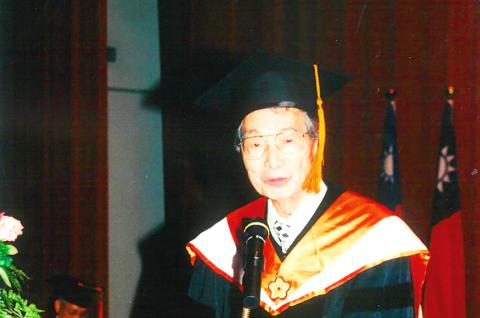Chinese-born American bioengineer Fung Yuan-cheng (馮元楨), considered the “father of modern biomechanics,” died on Dec. 15 at 100 years old, an obituary released on Friday last week by the University of California, San Diego said.
Born in 1919, Fung, who was also called Bert, obtained his bachelor’s and master’s degrees at National Central University (then located in China and later reinstated in Taiwan), before earning a doctorate in aeronautics in 1948 from the California Institute of Technology, where he was an assistant professor and researcher for 20 years.
In 1966, Fung joined the University of California, San Diego, where he cofounded its bioengineering program and recruited Chien Shu (錢煦), a renowned physiologist and bioengineer, as a lecturer.

Photo courtesy of National Central University via CNA
Chien, who is president of the Biomedical Engineering Society, has said that Fung applied the principles of fluid mechanics to biomedical engineering, and adopted a more precise and realistic way of thinking about human health.
Many of Fung’s papers were landmark achievements that built the foundation of biomechanics, Chien said.
Fung became an academician at Academia Sinica in 1968, and he received an honorary doctorate from National Central University in 2002.
In 2000, then-US president Bill Clinton awarded him the National Medal of Science, making him the first bioengineer to receive the distinction. He was also a member of the US-based National Academy of Engineering, the National Academy of Medicine and the National Academy of Sciences.
National Central University in 2008 named an asteroid discovered by the school’s Lulin Observatory 210434 Fungyuancheng, in honor of Fung’s scientific and academic achievements.

Alain Robert, known as the "French Spider-Man," praised Alex Honnold as exceptionally well-prepared after the US climber completed a free solo ascent of Taipei 101 yesterday. Robert said Honnold's ascent of the 508m-tall skyscraper in just more than one-and-a-half hours without using safety ropes or equipment was a remarkable achievement. "This is my life," he said in an interview conducted in French, adding that he liked the feeling of being "on the edge of danger." The 63-year-old Frenchman climbed Taipei 101 using ropes in December 2004, taking about four hours to reach the top. On a one-to-10 scale of difficulty, Robert said Taipei 101

Taiwanese and US defense groups are collaborating to introduce deployable, semi-autonomous manufacturing systems for drones and components in a boost to the nation’s supply chain resilience. Taiwan’s G-Tech Optroelectronics Corp subsidiary GTOC and the US’ Aerkomm Inc on Friday announced an agreement with fellow US-based Firestorm Lab to adopt the latter’s xCell, a technology featuring 3D printers fitted in 6.1m container units. The systems enable aerial platforms and parts to be produced in high volumes from dispersed nodes capable of rapid redeployment, to minimize the risk of enemy strikes and to meet field requirements, they said. Firestorm chief technology officer Ian Muceus said

MORE FALL: An investigation into one of Xi’s key cronies, part of a broader ‘anti-corruption’ drive, indicates that he might have a deep distrust in the military, an expert said China’s latest military purge underscores systemic risks in its shift from collective leadership to sole rule under Chinese President Xi Jinping (習近平), and could disrupt its chain of command and military capabilities, a national security official said yesterday. If decisionmaking within the Chinese Communist Party has become “irrational” under one-man rule, the Taiwan Strait and the regional situation must be approached with extreme caution, given unforeseen risks, they added. The anonymous official made the remarks as China’s Central Military Commission Vice Chairman Zhang Youxia (張又俠) and Joint Staff Department Chief of Staff Liu Zhenli (劉振立) were reportedly being investigated for suspected “serious

Nipah virus infection is to be officially listed as a category 5 notifiable infectious disease in Taiwan in March, while clinical treatment guidelines are being formulated, the Centers for Disease Control (CDC) said yesterday. With Nipah infections being reported in other countries and considering its relatively high fatality rate, the centers on Jan. 16 announced that it would be listed as a notifiable infectious disease to bolster the nation’s systematic early warning system and increase public awareness, the CDC said. Bangladesh reported four fatal cases last year in separate districts, with three linked to raw date palm sap consumption, CDC Epidemic Intelligence